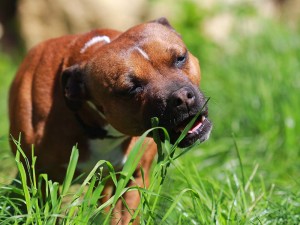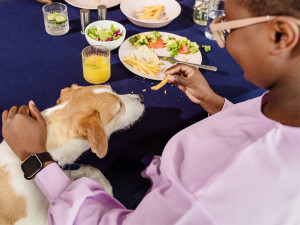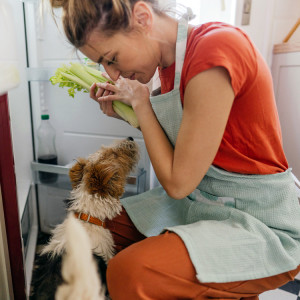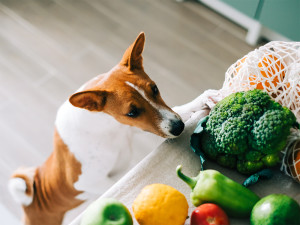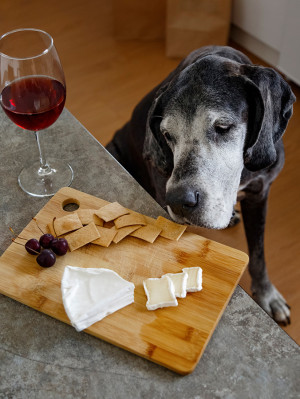Can Dogs Eat Garlic?
Like vampires, they should stay far away from garlic. Here’s why.

Share Article
In This Article:
Nutrition Facts About Garlic Signs of Garlic Toxicity Alternatives to Garlic
Many of us find our mouths watering at just the thought of garlic bread, let alone garlic butter chicken or shrimp. Although your dog’s mouth may water at the scent of garlic, too, it’s not something they should eat. Garlic is toxic to dogs and can cause serious illness if they consume enough of it. Since garlic is such a common addition to prepared dishes, it is important to check the ingredients on any foods you plan to share with your pup.
Nutrition facts about garlic for dogs
Garlic grows underground as the bulb of the Allium sativum plant. Other edible plants of the allium family include onions, chives, and leeks, all of which have similar properties to garlic.

Some health claims about garlic include anti-inflammatory, antimicrobial, and anti-cancer propertiesopens in new tab, along with many other claims that have not been scientifically evaluated. There are also claims that garlic can be used to prevent and/or treat fleas in dogsopens in new tab. However, this is not an effective way to treat fleas and can put dogs at risk for serious illness related to garlic toxicity.
Is garlic good for dogs?
Garlic is not good for dogs and can be toxic to them if they ingest enough of it. This is due to a compound in garlic known as N-propyl disulfide that is found in all plants in the allium family. This compound damages red blood cells, resulting in a condition called hemolytic anemia.
When their red blood cells are destroyed, a dog can feel lethargic, weak, have pale gums, difficulty breathingopens in new tab, and a racing heart rate. This could lead to collapse and/or death in extreme cases. Dogs with hemolytic anemia may also have a yellow tint to their skin and dark urine due to the breakdown of red blood cells.
These compounds can also cause damage to the digestive tract, resulting in pain and diarrheaopens in new tab. Signs of toxicity can take up to seven days to show up, and dogs can get sick both from eating a large amount in one sitting as well as after repeated ingestion over time of smaller amounts of garlic.
Can dogs eat foods cooked with garlic powder?
Dogs should not eat foods containing garlic powder, garlic salt, or any garlic variation. Even in garlic’s dried form, toxic compounds are still active. In fact, they can even be more concentrated in their dehydrated form, meaning dogs can get sick from eating a smaller amount of garlic powder than they would fresh garlic.
Of course, a dog still has to ingest enough based on their body weight to get sick, and food prepared with a small sprinkling of garlic powder may not be enough to cause any problems. However, regular ingestion of smaller amounts of garlic can cause problems over time, and smaller dogs will be more at risk for illness compared to larger ones. The safest option is to avoid garlic altogether, and to contact a pet-poison hotline right away if you are concerned that your dog has ingested garlic.
Is garlic completely safe for dogs?
Garlic is a known toxin to dogs, along with all edible plants in the allium family. This includes onionsopens in new tab, chives, leeks, and ramps. None of these plants are safe to share with your dog and should be kept far out of reach.
What are the signs of garlic toxicity in dogs?
Garlic toxicity can lead to several different signs. Some of these symptoms may develop many days after eating garlic.
Digestive upset: At both lower and higher doses, garlic can irritate the lining of the digestive tract, leading to pain, loss of appetiteopens in new tab, and/or diarrhea.
Lethargy: Dogs who develop anemia will feel very weak. They may get tired more easily, sleep throughout the day, or in more extreme cases, be unable to stand or walk.
Rapid breathing: Dogs with more severe anemia are not able to get enough oxygen to their tissues and organs. To compensate, they breathe rapidly and may take quick, shallow breaths.
Pale or yellow gums: Red blood cells give the gums and other tissues their bright pink hue. With anemia, or the loss of red blood cells, animals may have very pale pink or white gums. This particular kind of anemia causes the red blood cells to break apart, which can also lead to a yellowish tint to the tissues, known as jaundice.
Dark urine: As red blood cells break down, they release pigments that can make the urine appear very dark yellow or even brown.
How much garlic is toxic to dogs?
Garlic toxicity sounds pretty scary. But fortunately, the chances of your dog ingesting too much of it are fairly low in most situations.
A toxic dose that will cause digestive issues is around two grams per pound of body weight. That equates to about 10 cloves of garlic for a 25-pound pup. Larger doses are needed to cause red blood cell destruction.
Most dogs aren’t going to eat that much in one sitting, but remember that the toxic effect can be cumulative, so dogs who eat smaller amounts long-term can have issues. Also, remember that powdered forms are more concentrated, so it takes less of these products to create a problem.
How to treat garlic toxicity in dogs
Contact your vet immediately if you see your dog eat large amounts of garlic and/or if you notice any signs of toxicity. If your dog is brought in within a few hours of eating garlic, your vet will try to induce vomiting to remove as much garlic from their body as possible.
They will then administer activated charcoal to your dog to absorb any residual garlic, and perform bloodwork to check red blood cell numbers. Fluids and other medications may be required, and in severe cases, blood transfusions may be needed to replace any destroyed red blood cells.
Alternatives to garlic for dogs
Dogs have fewer taste buds than humans, so they don’t need seasonings like garlic to enhance the flavor of their food. So, if you choose to share safe human foods with them, just serve them something plain. Safe and healthy choices include:
Lean meats and fish
Cooked eggs
Bottom line
Garlic or any member of the allium family isn’t safe for dogs to eat. Smaller amounts can cause digestive issues, while large amounts can destroy red blood cells.
If you see your dog eat garlic, contact your veterinarian immediately. Treatment is more successful the earlier it is given.
FAQs
Can dogs eat any part of the garlic plant?
No, garlic and all plants of the allium family are toxic to dogs, and they should not eat them.
Can I feed my dog garlic bread?
Though the amount of garlic in garlic breadopens in new tab is fairly small, it’s considered a food that’s not good for dogsopens in new tab. Garlic bread contains a lot of other ingredients, such as butter, and the bread itself will provide your dog with excess calories that they just don’t need. It may also cause digestive issues.
Can I give my dog garlic supplements?
Garlic supplements have varying concentrations of garlic, so while some may be relatively safe, others may not. Your best bet is to not feed your dog garlic supplements and speak to your vet about alternatives.

Dr. Chyrle Bonk, DVM
Dr. Chyrle Bonk has been a mixed-animal veterinarian since 2010, with a special interest in rehabilitation. When she's not practicing or writing about veterinary medicine, you may find her exploring the outdoors with her family or tending to her cows, horses, chickens, or cats and dogs.

Dr. Amy Fox, DVM
Amy Fox, DVM is a small animal veterinarian in New York City with over thirteen years of experience in a mixture of general practice, emergency medicine, and shelter medicine. A lifelong animal lover, Dr. Fox studied biology in college and then worked as a veterinary nurse before pursuing veterinary school at Cornell University. Her expertise includes surgery, dentistry, and management of chronic conditions, and she is interested in toxicology, pain management, nutrition, care of senior pets, and educational outreach. Dr. Fox also enjoys writing about veterinary medicine and teaching, and her work has previously appeared in Spruce Pets. In her free time, she loves to cook, garden, go for long runs, and hang out with her goofy mixed-breed dog May, who provides never ending comic relief!
Related articles
![Staffordshire bull terrier dog eating grass]()
15 Things You Think Are Toxic for Dogs — But Actually Aren’t
From (human) prescription meds to poinsettia plants, these "toxic" items may not be so bad for your pup.
![Red-haired woman holding sleeping dog in her lap on the bed]()
6 Reasons Your Dog Is Vomiting
And how to help them feel better fast.
![A woman feeds her dog with a piece of fries during lunch.]()
Can Dogs Eat Potatoes?
We know they are your adorable little potato, but can they snack on one?
Can Dogs Eat Celery?
Sure, they can have a bite—if they want one.
![Curious Basenji dog puppy climbs on the table with fresh vegetables at home in the kitchen.]()
Can Dogs Eat Broccoli?
Find out how to safely get your pup their greens.
Can Dogs Eat Cheese?
We know they want to — but how much is safe?




